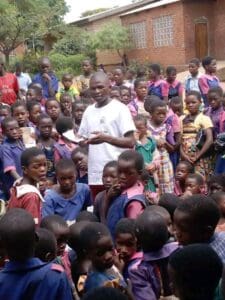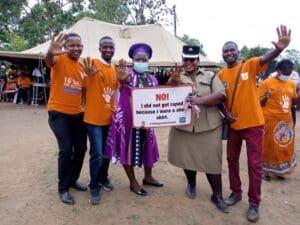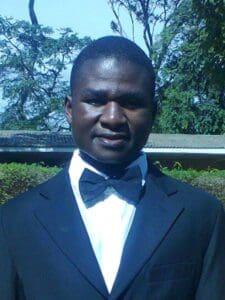Standing for Children Protection and Women Empowerment in Malawi. Member Spotlight: Brown Masingati
Malawi, also nicknamed as ‘the warm heart of Africa’, is well known for the friendliness and openness of its inhabitants, and the beauties of its natural heritage. Regrettably, the small east African nation is also familiar to key social problems such as high unemployment rates, bad justice, and lots of unreported cases of domestic abuses against women and children. Thankfully, the country counts on several activists and social workers, who are passionately committed to create a more safe, healthy, and resilient society in Malawi. Among the many, Brown Masingati stands out for its incredible commitment and vision to the benefit of the most vulnerable groups. Notably, he has been working for years towards the goal of a better protection of women and children, providing trainings, and advocating for their cause both at the local and the national level. At the core of his work, he has been actively involved with governmental institution and various stakeholders to ensure better protection for children and women in the whole country, embracing both a top-bottom and a grassroots approach to tackle these long-unresolved issues. Among the others, he has worked for World Vision Malawi, Partners in Action for Sustainable Development and the Centre for Social Research of the University of Malawi.
Good morning, Brown, and thank you for being here today. To get it started, could you tell me more about how you started your career?
Thanks to you. Well, I started my journey earning a bachelor’s degree in theology at the Zomba Theological College. Here, I also added a certificate in conflict resolution and conflict management, plus various other certifications such as a HIV Counselling Management certificate and a course in Child Justice. Spanning on different ambits, I recently summed to all these a certificate in Geospatial Data for Disaster Risk Management from the Malawi University of Science and Technology.
Is there a reason why you chose this particular path?
Growing up in Malawi, I decided to take a stand for what I believed were the most urgent issues. Here, we have a lot of cases of child and women abuses and injustices, numbers are very high! Along my studies and early steps in the job market, I developed and strengthened a passion in working with them, namely those minority segments of the society that are unprotected the most. Experience summed up progressively. For instance, I was involved with big advocacy campaigns against gender-based violence in the district where I live, to the point I got to be recognized by many external stakeholders as the focal point for women empowerment and children protection in my area. Indeed, I am very trusted by my community of these issues, having become the point of reference for when these unfortunate situations occur.
Other than what you already mentioned, why you became interested in mediation? In your view, what is the power of it?
 Mediation has the power to build a resilient society, to bring together warring sides around a table and strike reconciliation to bring peace at the household, community, and international level. The wars we see and the blood that is shed today, would not be there if there had been dialogue. Sometimes, warring sides want peace, but they lack a mediation point to join their interests and aspirations. Overall, I became interested in mediation because of my deep passion in working towards the objective of bringing peace and harmony in Malawi. I am a peace living man and I dream about building a country where justice is ensured equally for all.
Mediation has the power to build a resilient society, to bring together warring sides around a table and strike reconciliation to bring peace at the household, community, and international level. The wars we see and the blood that is shed today, would not be there if there had been dialogue. Sometimes, warring sides want peace, but they lack a mediation point to join their interests and aspirations. Overall, I became interested in mediation because of my deep passion in working towards the objective of bringing peace and harmony in Malawi. I am a peace living man and I dream about building a country where justice is ensured equally for all.
You said that you are majorly committed to the protection of children and the empowerment of women; can you expand more about your involvement in Malawi tackling these issues?
Firstly, within various positions I covered, I have been working hand in hand with different stakeholders, from community members to governmental actors, to ensure better protection for children in their daily surroundings. At the moment, I am working with a community-based care centre, a kind of kinder garden, where we can monitor the children directly and apply the appropriate safeguards to their treatment. My role mainly consists in giving trainings on child protection, teaching to staff and the families their rights and obligations regarding child protection, in order that any kind of abuse can be reported to the authorities, and that there could be good cooperation between different level stakeholders into tackling such issue. In fact, here in Malawi organizations need to work closely with the government if they want to have a greater impact, hence I am collaborating with governmental institutions to maximize the impact of my work. Moreover, I am also a trainer for trainers, seeking to educate more people to become child protection workers in different areas of Malawi.
Regarding the topic of women empowerment, my vision is for women to become less marginal within the Malawi society, and more game changers, by first and foremost becoming financially independent. On this, I mainly use my trainings skills to teach women business-related skills and knowledge, finding ways to empower them and make their lives thriving. I have been doing this both voluntarily on my own community and in collaboration with NGOs and State actors. Most women, in fact, are constrained and marginalized by the fact that they cannot contribute economically to the sustainment of the family, and such situations create a power imbalance between the man and the woman. I am here to protect them, to groom them and to help them in all possible ways to move their lives forward.
Where do you think these problems are arising from?
 Malawi is a developing country with several problems affecting the most vulnerable groups, lots of cases of violence against women and minors that remain largely unreported, adding upon a critical situation economically and employment-speaking. Certainly, the whole Covid-19 worsened even more such divides, sucking attention out from the already existing social problems. In general, however, we could say that the attention of the State is directed towards solving economic problems, and all the remaining issues are majorly neglected.
Malawi is a developing country with several problems affecting the most vulnerable groups, lots of cases of violence against women and minors that remain largely unreported, adding upon a critical situation economically and employment-speaking. Certainly, the whole Covid-19 worsened even more such divides, sucking attention out from the already existing social problems. In general, however, we could say that the attention of the State is directed towards solving economic problems, and all the remaining issues are majorly neglected.
So, how do you think mediation and other ADR practices could help the situation out?
I live in a continent with a divided society due to socio-economic challenges and other geopolitical factors. In absence of figures as the mediators, what we have left is a society that is dangerous to live in, especially for children and women.
Passing briefly to your experience with MBBI, what is your view about the organization?
I want to play a role because I am a man who love peace and hate conflict. In Malawi, there is quite some gap regarding conflict resolution skills and knowledge. I would like to take this opportunity with MBBI to learn and take some initiatives to implement in my community so that issues such as gender-based violence can be reduced and women, girls and children’s rights are protected, and they can enjoy living in peace and harmony to the fullest. I would also be eager to organize trainings with governmental institutions and other stakeholders on the different concepts of conflicts resolution and mediation, in order to foster reconciliation and pacification processes all across the country. I would like also to take the issue of conflicts to religious groups as it will help them to heal problems the religious bodies encounter in their everyday life. Overall, I would like for MBBI to have a positive impact in Malawi on issues of peace building. We are deeply in need of that.
Written by Matteo Piovacari: MBBI Writer

